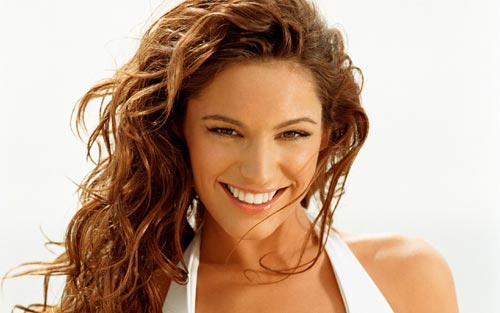|
 A new book by an economics professor at the University of Texas-Austin reveals that being attractive pays - with good looking employees enjoying more perks and higher pay packets than their plainer colleagues. |
|
A new book by an economics professor at the University of Texas-Austin reveals what the world of advertising has known for decades - that beauty sells. But Daniel S Hamermesh also shows that being attractive pays - with good looking employees enjoying more perks and higher pay packets than their plainer colleagues. Professor Hamermesh has studied what he refers to as the economics of beauty for about 20 years. In his book Beauty Pays, published by Princeton University Press, he claims good looking people enjoyed perks beyond their pay - such as party invites, business travel and office privileges - while less attractive workers are overlooked and can often be victims of discrimination. Attractive people are more likely to be happier, earn more money, get a bank loan (with a lower interest rate) and marry equally good looking partners. As a result, attractive employees are more productive, leading to higher sales and potentially higher profit for themselves or the company they work for. Less cut and dried is what constitutes attractiveness. Far from being merely in the eye of the beholder, Professor Hamermesh points to a few subconscious factors - such as the symmetry of the face, facial expression and popularity factors (if the person looks like someone popular or famous). In his book, Professor Hamermesh estimated that attractive people earned on average about £145,000 more in a lifetime than those with below-average looks. A beautiful woman would earn four percent more, and handsome men three percent more, than their plain counterparts. When the professor's research became widely known in the early 1990s, he came in for some criticism - namely from comedian Jay Leno, who asked why someone like Dallas businessman and presidential candidate Ross Perot earned more than someone like actor Rob Lowe? But Professor Hamermesh brushed this off, being quoted in the Sydney Morning Herald as saying: 'We don't talk about individuals; we talk about the average good-looking person and the average bad-looking person. There are always outliers.' Of course education and work experience were important factors in earnings, but Professor Hamermesh said his new book, based on his research, showed that a person's looks were impossible to ignore. (Read by Nelly Min. Nelly Min is a journalist at the China Daily Website.) (Agencies) |
得克萨斯大学奥斯汀分校的一名经济学教授在他的新书中揭示了一个广告界几十年来已经熟知的真理:漂亮的东西卖得好。 但是经济学教授丹尼尔•S•汉默梅希还指出,长相有吸引力可获利——长得漂亮的雇员比相貌平平的同事津贴多、薪水高。 汉默梅希教授已经研究他所谓的美貌经济学达20年之久。 在他的《美貌价更高》一书中,这位教授称,长相好的人将获得薪水之外的特别待遇,如派对邀请、商务旅行和职场特权,而长相平平的同事则经常被忽略,成为外貌歧视的受害者。该书由普林斯顿大学出版社出版。 长相漂亮的人通常更快乐,挣的钱更多,能得到利息更低的银行贷款,还能和长得同样漂亮的伴侣结婚。 因此,长相好的雇员业绩更突出,并会为自己或为自己供职的公司带来更高的销售额或更多的潜在收益。 人们对魅力的组成要素并没有统一不变的理解。汉默梅希教授认为,美貌根本不是仁者见仁的事,他指出人们潜意识里有几个判断美貌的要素,如脸部的匀称、面部表情和一些流行元素(比如长得像明星或名人)。 在他的书中,汉默梅希教授估计长相漂亮的人一生平均要比那些其貌不扬的人多挣14.5万英镑。 美女将比长相平平的女人多挣4%,帅哥将比长相平平的男人多挣3%。 这名教授的研究早在20世纪90年代早期就已经广为人所知,当时他遭到了一些批评,喜剧演员杰•雷诺就提出质疑说,为什么达拉斯商人、总统候选人罗斯•佩罗这样的人挣得比演员罗伯•劳这样的人还多? 不过当时汉默梅希教授对此不予理会,《悉尼先驱晨报》援引他的话说:“我们谈论的不是个体,我们谈论的是那些长得好看和长得难看的普通人。总会有个例存在的。” 当然教育和工作经历也是决定收入的重要因素,不过汉默梅希教授在他的新书中指出,他的研究显示,要忽略一个人的长相是不可能的。 相关阅读 (中国日报英语点津 陈丹妮 编辑:Julie) |
|
Vocabulary: perks: 津贴,额外补贴;特别待遇 cut and dried: 最终的,不会变更的;事先准备好的,预先安排好的;常规的,例行的。cut-and-dried words意思是“套话”。 in the eye of the beholder: 来自谚语Beauty is in the eye of the beholder(情人眼里出西施),这里引申为“仁者见仁,智者见智”。 come in for: 受到;得到 brush off: 置之不理 outlier: 处于外面的东西,外人,例外。 |
